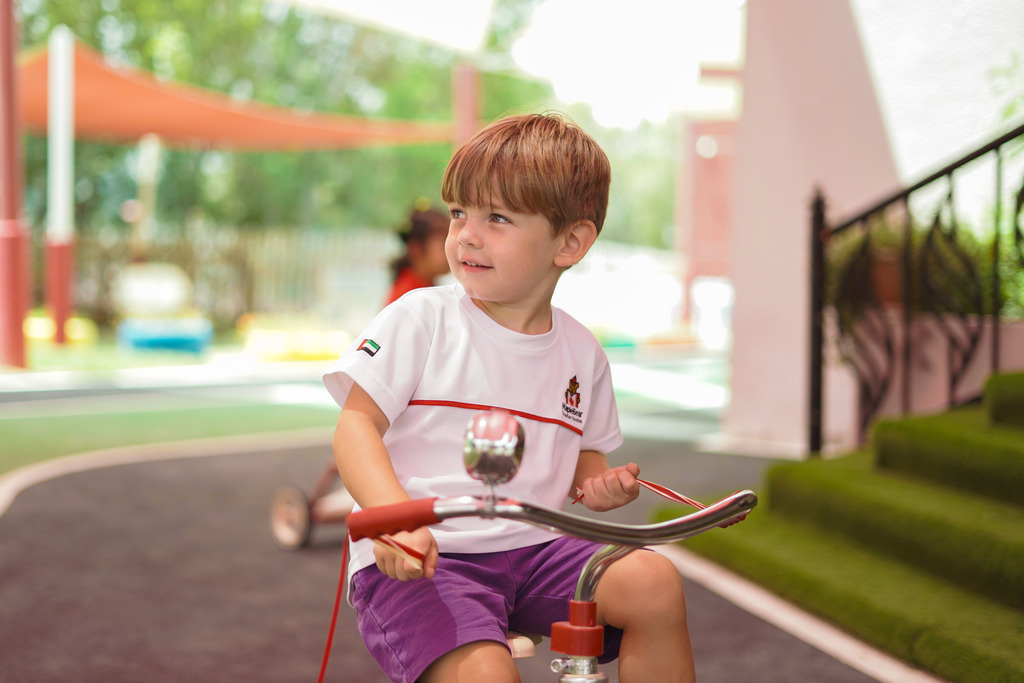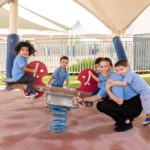Some children embrace their new nursery, their teacher, and new experiences in general, with excitement and curiosity, while others like to hang on to mom and dad’s hand a little longer. Sometimes, it can even be mom and dad who are still not ready for their little one to go! Every child, and each parent, is of course, different. The Maple Bear team is keen to support parents in building comfort around their child’s new routine, especially during their first few weeks of enrollment at Maple Bear.
When a child cries during the first few days of separating when starting the school year, whether at a new nursery or returning to their old one,
Here are some things mom and dad can do to make it easier:
1| Develop a “goodbye” routine:
Routines are reassuring and can be as simple as a special wave through the window or a goodbye kiss. Direct them to the same activity each time you arrive for a while. If they enjoy colouring, go to the colouring books and get them started there.
2| Do not linger behind:
The longer you linger the more prolonged the anxiety will be for your child. Your child will ask for another kiss and hug, this will confuse the goodbye routine. Tell your child one hug, one kiss and then goodbye. If your child is throwing a tantrum, hand them over to the teacher and leave. The teacher will be able to calm them down and then it will all be over. This may happen for a few days, but if you are determined to be the “winner” then eventually the tantrums will stop. Then you will both be the “winners” when your child learns to control himself.
3| Don’t show any signs of guilt, anger or insecurity.
Try to act as confident as possible – it will make a child feel secure and protected. Your child will eventually learn the sequence of their day; they go to school and get hugs from you when you leave. At school they will have fun and play and learn to trust themselves and the teacher. Then, they will get picked up by you for more hugs and kisses.
Children need to learn to develop a secure, trusting relationship with another adult. This is difficult for some children. Some children cry at times of separation for as long as a month. Some children will be so upset at first that they throw up. Some children will hit you in anger at separation and then again when you pick them up. This is normal, too. It sure can make a parent feel bad. All the emotional turmoil that you and your child are feeling is normal and a good indication that you feel a strong connection and bonding with each other.
Children are proud of themselves when they can master their own feelings and enjoy school.
4| Make sure they have a good night’s sleep and a full breakfast.
Kids tend to exhibit a heightened sense of separation anxiety when hungry or tired. So, try to keep your kid healthy and hydrated during the school day.
5| Always be on time during pick-up time.
Seeing other parents taking their kids home while his/her Mommy or Daddy is nowhere to be seen makes the child feel insecure. They may feel that their parent has not kept their promise of being there when school is finished. In fact, it can be helpful to collect the child early during the first few days of starting school, as they adjust to the new routine.
What your nursery should be doing to help mom and dad with your separation anxiety:
Today, technology makes it possible for the nursery team to help mom and dad rest at ease while the family is still adjusting to the new nursery routine. Often, throughout the day, images and updates are shared over a parent communication app, which parents are able to access, and can also message the school staff through. The school administrator or principal will also call parents for periodic updates during the first few days, and can always be reached by the parents to communicate news or ask questions.
You may notice that your child is a little more tired than usual, or is eating a little less during the first few weeks – this is normal, as they are still adjusting to the new activities and excitement. The Maple Bear team will of course keep an eye on this and remain committed to helping the child adjust to the new rhythm while maintaining healthy habits.








Thanks for sharing your thoughts about meta_keyword. Regards|
Was looking for something different and found XSHN. Not bad at all! Plenty to see. I will be coming back soon!: xshn
Diving into the world of safa777game. Wish me luck! Gonna try my hand at some high stakes action. Will report back with the results!